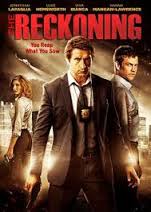
THE RECKONING
Australia, 2014, 86 minutes, Colour.
Jonathan La Paglia, Viva Bianca, Luke Hemsworth, Hanna Mangan Lawrence, Alex Williams.
Directed by John V. Soto.
There have been a number of films called The Reckoning. This is an Australian one, set in Perth.
Reckoning always seems to include some kind of calling to account and justice being done. And that is the case here, although much of the justice is avenging justice, vindictive justice.
An initial focus is on flashback memories of two sisters who are devoted to each other, together on a beach. We are then introduced to a Perth detective, played by Jonathan La Paglia, woken early in the morning to be told that one of his police partners has been shot.
So, on one level, this is a police investigation and detective story, trying to find the killer of the policeman and discovering a long trail of killings over several days. This involves quite some footwork for the detective and his partner (and there are some domestic complications concerning the detective’s wife and daughters in the presence of his female partner). But, he discovers a memory stick in the pocket of the dead policeman and find some video, a young girl (one of the sisters we have seen at the beginning) saying that she has little time to live, is making a documentary about her search for all those responsible for her sister being high on drugs and being killed in a hit and run accident.
As might be expected, there are several twists in the narrative, not everybody being what they seem to be.
However, what makes the narrative somewhat different is the religious dimension. Rachel, the girl on the quest, who was accompanied by a young man who has just been released from a mental institution and has no qualms about violence, is particularly religious, even going to a church and insisting that the reluctant priest marry the couple instantly. She seems to have an unlimited number of quotations in her memory from Old Testament and New Testament, to put as captions in her documentary, relating to each of the guilty parties that she discovers.
(Although there is a script editor credited, when a quotations from Romans 13:4 is discovered and one of the officers in the police precinct doesn’t know what it means, Jonathan La Paglia actually says it is a book of the Old Testament – and soon after, on screen, there is a quote about those who commit heinous crimes getting not their just deserts but there just desserts!. Maybe not too many people noticed, but they are disappointing slips in a rather polished production.)
It all leads up to a confrontation, some revelations that we may not have been expecting, a sad ending for Rachel and an uncertain ending for the detective.
1. The title? Justice? Biblical vengeance?
2. The Perth settings, the suburbs, homes, motels, diners, police precincts, garage? The streets? The atmospheric score?
3. The film as a police detection story? The phone call, waking Robbie, working with Jane, at headquarters, the particular case, the missing girl, the connection between Robbie and AJ, the death of his father in the fire, chained? Jason as his friend, his reaction to the news, in the car, the memory stick in Jason’s pocket? Work on foot, interrogations at the motel, about the cars, the registration?
4. The flashbacks, Jason and his working on the car, offering it to Robbie? Robbie talking to Jason, about his drug connections, wanting to get out? The gun at his head? Jason as the bad cop, giving up Robbie’s name, his death?
5. Robbie and Jane, partners at work, personal relationship, Robbie and his family, the daughter and her fear of the tarantula, his love for his daughters, his wife, their dislike for Jane? Robbie’s wife, love?
6. Rachel’s story, making the documentary, talking to her mother, running away from home, not saying goodbye? AJ and the handheld camerawork, Rachel’s memories of her sister, on the beach, the drugs, her death, hit and run? The gradual build-up over the days of the film, AJ and his work with Rachel, love, his violence, killing? The marriage ceremony, at short notice? The couple tracking down each leg in the drug distribution chain? The distributors, Lucas at the diner, leading to other distributors? Alex at the motel? Interrogation, everyone giving up names? Hugo? The other folks?’s AJ and his strangling?
7. Driving with Jason, the gun, Jason giving up the information, naming Robbie?
8. Robbie’s memories, driving with Jason, saying that the drug deals? Getting Abigail, wanting to stop, Jason and the gun, not wanting the car to be searched? Robbie and his conscience, with his family, the night with his wife, the sexual encounter?
9. Robbie and his conscience, with his family, the night with his wife, sexual encounter?
10. Rachel in the house, threats, AJ and his holding the knife? The distraction, Robbie shooting AJ? The lights out, the chase through the house, cat and mouse, up to the river, the final confrontation, Jane shooting Rachel, Robbie consoling Rachel as she died?
11. The significance of the religious dimension, the title, Catholic iconography? The candles and Rachel’s Pledge? Her terminal illness, as a church, the priest, her asking her to marry them, his reluctance, the pressure on him, the very brief ceremony?
12. Rachel sending the film to the police headquarters the different headings, each of the persons in the chain, the texts quoted, vengeance texts? The candles, asking God to give her enough time for the mission?
13. The aftermath, for Robbie, his life, conscience, family, police work?